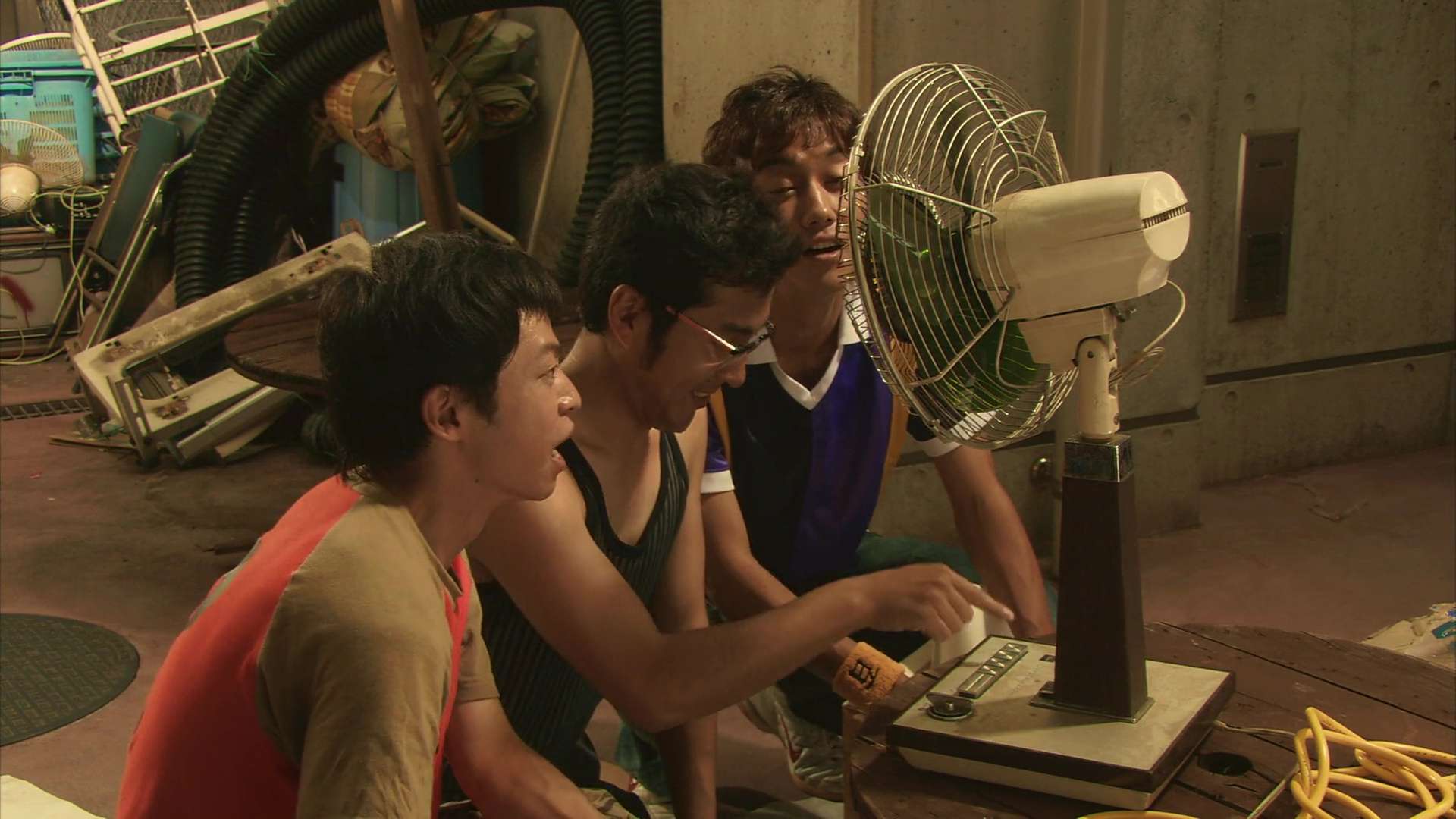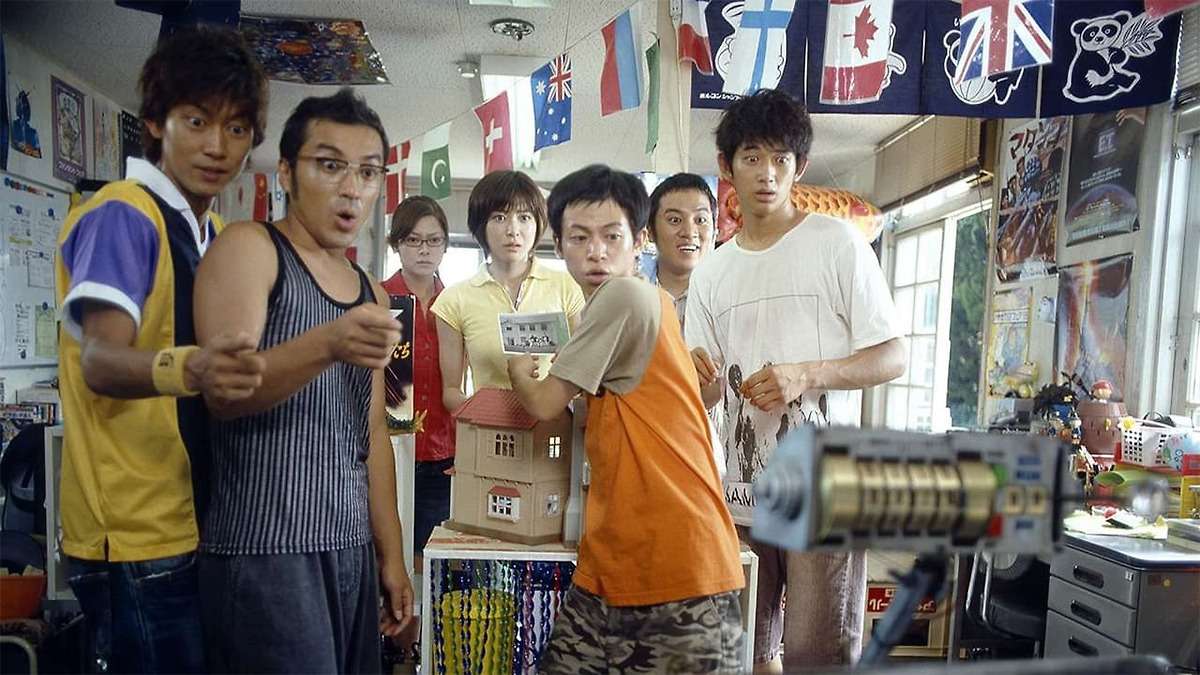If you take any time travel movie and try to examine the science behind it, you may just end up with a massive headache. As accurately as any filmmaker can attempt to make this sub-genre, paradoxes arise that turn the film and its logic on its head. Despite its status as a genre classic, “Back to the Future” eats flak when it comes to its depiction of time travel and its contradictory logic. Yet the film remains a timeless, engaging classic because of the way it is laid out to the viewer.
Despite the high-stakes scenario of the film and the sub-genre as a whole, what makes the logic of the concept work is a healthy dose of irreverence. That level of fun is translated into Katsuyuki Motohiro’s “Summer Time Machine Blues,” a film that pays a touching tribute to “Back to the Future” while simultaneously trying to dissect the logic behind its time travel shenanigans.
There’s a poster for the film at a local theatre and a clock at the university setting reminiscent of the tower in “Back to the Future.” The plot even involves a time traveler in a chance encounter with his parents and even a heated debate about the fallacy of the science behind the film. Much like “Back to the Future,” “Summer Time Machine Blues” works supremely well because it has a clean-cut premise. The film has the kind of logline that makes for a saleable elevator pitch.

During an intense hot summer, members of a university Sci-fi club are put into crisis when the remote to their air conditioner is broken. Unable to fix it, they find the miraculous solution of a time travel device that helps them return to the previous day to prevent the remote from breaking. However, time travel isn’t that simple. Of all the reasons to travel, our heroes in the film have very low-stakes ambitions that grow convoluted over time. Time travel opens all kinds of opportunities for characters desperate to make a change, even ones as laidback and fun as the film’s protagonists.
Writer Makoto Ueda constructs a fairly simple plot, hinging on the complexities that come with the science of time travel. As mentioned, meta-humor is abundant, trying to make sense of the contradictory nature of altering the past to affect the present. Alternate realities are a question barely addressed, whereas closing the time loop to fix the present properly creates the real tension the narrative hinges on. In that sense, Ueda’s screenplay is surprisingly tight, with the film being a rewarding adventure, especially on re-watch. The opening of the film captures the protagonists and their initial day before the inciting incident. It’s a fascinatingly structured sequence with odd moments alluding to upcoming events. The genius is revealed as the mystery of the time travel events unravels.
Takuya Taguchi’s editing, along with the sound design, helps enhance that sense of foreboding weirdness. The shenanigans the group gets through on the first day are cut into jarring chapters as the frame abruptly goes black with a vibrant touch of time-rewinding sounds. There’s a massive focus on clocks up until the time machine arrives in place. Destiny as a theme plays a crucial role in the concept; the craft aids in streamlining these heady concepts into an entertaining film. As the film’s title suggests, the summer season plays a vital role in the protagonists’ decisions. In such a low-stakes adventure, it becomes important to understand why the characters want to make this change using time travel. For that, the visual narrative is of utmost importance.
The cinematography of Kazunari Kawagoe swims across frames that truly sell the intensity of the summer. Hot hues of brown and yellow, graded with intensity, contrast the colorful vibes of the film. Summer is a struggle for these students, who are used to spending the holidays in their little clubhouse. Shots are lit spectacularly and display the refracted lighting and effects such that it produces the look typical of a summer heat wave. Accompanying this is an eerie styling to the camera work. Fish-eye lenses are used to contrast with frozen frames, providing a level of quirk fitting to the film’s premise. VFX is kept at a minimum, used only to depict the twisty ride of the time travel machine.

To Ueda and Motohiro’s credit, none of the films’ oddball style confuses the viewer. Everything the screenplay humorously lays out about time travel is given reason to exist and make sense without bombarding the audience with the science. Hilariously, every time the student’s science mentor attempts to explain the contradictions of the situation, no one is bothered to listen. These humorous scenarios extend to most of the characters and their quirks. Stand out among them is Yoshiaki Yoza as Masaru Niimi, unable to grasp the danger of the group traveling to the past. Niimi is simply desperate to prevent the theft of his shampoo from the previous day, which was stolen at the local bathhouse. To save his shampoo, he ends up stealing it himself.
Small details like these are part of how Ueda closes the loop of the film. Adapted from his theatrical play of the same name, his writing is genius. Even if the audience examines the loopholes in the time travel logic, Ueda’s writing is airtight about the construct of the journey the characters take. There are hints of time travel shenanigans early in the film, in the first-day sequence, and everything is neatly tied once the film arrives at its dénouement. The playfulness Ueda provides with the sci-fi concept is paralleled well by the comedic touches. The film goes so far as to tie in the history of the town and the University to the actions of its protagonists traveling through the past.
One can question the logic of it all, but much like the films it reveres, “Summer Time Machine Blues” becomes an instant classic because it plays so well with its concept. At the end of the day, what the audience needs is to be so engaged that suspension of disbelief wins over reason. In that case, “Summer Time Machine Blues” does a wonderful job.




![Shin Ultraman [2022]: ‘NYAFF’ Review – More like an episodic love letter to Ultraman by fans than a cohesive movie](http://www.highonfilms.com/wp-content/uploads/2022/07/SHIN-ULTRAMAN-MOVIE-REVIEW-3-768x512.jpg)
![Mangsho [2020] Short Film Review: Raw, Unpleasing and Unforgiving](http://www.highonfilms.com/wp-content/uploads/2020/05/Mangsho-768x370.png)
